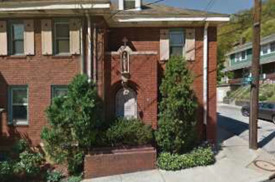Southwestern Veterans Center
7060 HIGHLAND DRIVE, Pittsburgh, PA 15206

Compare Southwestern Veterans Center with Trusted Communities Nearby
About Southwestern Veterans Center in Pittsburgh, Pennsylvania
Southwestern Veterans Center, located in Pittsburgh, PA, offers memory care and assisted living options. The facility includes various room types, such as apartments, to facilitate comfort and a home-like atmosphere for residents. Some apartments are equipped with living rooms and kitchenettes, providing opportunities for privacy and independence while still receiving supportive care. The community features numerous amenities designed to enhance residents' quality of life. Outdoor common areas provide a space for residents to enjoy fresh air and nature. The facility welcomes pets, which can offer companionship. There is a range of social activities and events, including organized programs, yoga, stretching opportunities, and facilitated field trips, allowing residents to engage with others. Communal dining options and meals create a shared community atmosphere. Additionally, WiFi and internet access are available, aiding residents in staying connected with family and friends. Southwestern Veterans Center also ensures that residents' daily needs are met through various services. General transportation services provide ease of travel to appointments or outings, while housekeeping services help maintain clean and tidy living spaces. These amenities and services contribute to a supportive and engaging environment for residents.To learn more about this provider’s license and review other available state reports, please visit: Pennsylvania Department of Human Services Provider Directory
Connect with a Family Advisor for Free Expert Help
Get personalized recommendations
Unlock pricing info sitewide
Book tours to explore local options
Tell us about your situation
Who are you looking for?
Reviews of Southwestern Veterans Center in Pittsburgh, Pennsylvania
2.0
(2 reviews)
Facility
3.0
Staff
3.0
Food
3.0
Activities
5.0
Value
3.0
PatriotHill
3
|
May 17, 2020
My dad was a resident at SWVC for about 13 years, passing away within the past 8 months. My dad’s military background made a very strong imprint on him and so I wanted him to be in a congregate setting with other veterans. I had observed during his stay at the VA (federal) nursing home stay that preceded his admission that the vets look out for one another. There were good times that I spent with my dad over the years there, taking him to activities and enjoying the out of doors on the premises. There are very nice areas to sit and enjoy nature like pavilions and patios. They had good activity staffs and a good variety of onsite and offsite enriching activities. There were problems, like theft. Eventually we would have to lock up certain things in a box that had a keyed lock. Things like a DVD player, ceramics projects, throw blankets, hats, and other personal belongings were stolen. It was impossible to keep a tv remote in his room and at some point, someone started pushing his tv away from his bed. The administrators blamed wandering residents but if that were the case, the items would have been found in resident’s rooms. There were safety issues like the wheelchair hand lever locking mechanism being out of position and incidents of the bed’s locking mechanisms disengaged, which could lead to a fall. At some point they changed the meal service so that hot foods were service on the floor by a single server handing off plates to be distributed by the staff in the dining room. While this improved the overall readiness of the food for serving (the old food service had carts with inconsistent heating of trays), this change resulted in some residents waiting way too long to be served. Over the years, if there was a nurse or aid that was kindly and caring toward my dad they would inevitably be moved to another unit and never rotate back. There were problems with the administrative and nursing staff exploiting my Mom’s trusting nature and her fear of making waves. They used these manipulations to obstruct me and a sibling from being able to do our duty to be vigilant about certain things involving meds and other aspects of care. My elderly Mom (the POA) was not able to visit that often over the years so me and my sibling were the ones most involved in onsite monitoring of our Dad’s care. In the earlier years there was an outrageous incident involving a follow-up medical appointment that I had scheduled for my dad. I told the staff about the appointment but on the day of, they held up departure on the floor. I signed the liberty log and when I expressed frustration with being held up, my recall at that time was that someone waved me on saying that they would take care of the secondary form required for taking residents off grounds (They would dispute that this happened, because a charge nurse cut me off to prevent me from taking my Dad off the grounds). Another day I returned to the facility, was intercepted by a guard and told that I could not enter the facility. From there, they had the wicked gall to limit my visitation to a half hour in the evening trying to construe that my Dad’s safety could not be trusted to me – a twisted turnabout to cover up the matter of them trying to prevent me from taking him to his medical appointment. This went on for a couple of months. Some time after this protracted incident, me and my sibling had our mom sign a release to permit us to freely discuss his care with the medical staff, but in the months before my Dad’s passing, they persuaded my Mom to verbally rescind that form. Long after this issue was resolved, one ignorant nurse made a point of pretending not to know that I had full privileges to take my dad off grounds upon getting the required forms completed (which exemplifies the attitude problem with some staffers at SWVC). There was also an issue , in the first year or so of a lead physician (which may have been actually been an employee of the federal -VA system) spurning input from a geriatric psychiatrist who had done some cognitive testing on my dad and had some ideas about some changes in his meds. Take note that a resident has every right to consult an outside medical specialist and the facility had absolutely no right to have iron-fisted control over his access to a private physician. At some time during my Dad’s residency, they put a dementia diagnosis into my Dad’s records. My Dad did not have dementia. Cognitive impairment residual of a stroke is not the same as dementia. A dementia diagnosis can be a driver and contraindication in all sorts of serious medical decisioning and it should never be in someone’s medical records unless it is substantiated by competent evaluation. Even in the three months leading up to his passing, my Dad, despite some cognitive impairments, which were relatively stable over the thirteen years, could recognize all family members, knew where he was, could tell you what day of the week it was, when the month changed over, who the President was, was abile to play bingo, and card games with me, etc. Jumping forward to the end, I will be forever scarred by the image of arriving at the facility to see my Dad, severely weakened, a nearly skeletal figure of his former self from weight loss brought on by some years of dysphasia aspiration and some neuro-mentation problems – being forced to sit up in his wheelchair and taken to the dining room. His face had the look of a stupor. I had to engage in a verbal confrontation in which the nursing staff adamantly refused to put him back in bed. In 13 years I had never gone to visit the facility first thing in the morning before work like that. I went that morning suspecting that I would catch them having my Dad out of bed after a charge nurse over the weekend told us that my Dad should be sitting up for hours for reconditioning after a very recent hospitalization that might have not happened if a family member had not been at the facility at the time (I would call someone this disconnected from the reality of my dad’s physical condition to be sociopathic). Sometimes, after a hospitalization it can be good practice to rehabilitate a patient or resident, having the person sitting up for periods of time and when appropriate, light physical therapy. At this juncture, however, my dad’s condition was so deteriorated that this kind of rehabilitative approach was totally inappropriate. I found exactly what I expected to find that morning. Finally, I returned to the floor after calling my mom and blocked his wheelchair demanding that they return him to bed. When they relented after a call from my mom, two aides lifted him out of the chair into bed, his body just collapsed and he exhaled as in physical distress. It was painful to watch this happen to my dad. Finally, I had to call the head office of the veteran’s home and spoke to a physician who I believe had oversight for the facility. I credit and thank this doctor for instantly recognizing from my description of my Dad’s recent medical history and his present condition that my Dad needed to be sent out to the hospital. At the hospital they found that my Dad had acute pneumonia. By then his dysphasia was so severe that artificial feeding was the only option – which my dad had expressed over the years that he did not want. My dad did not last much longer after that. I am left wondering, however, if certain medication decisions led to the exacerbation of dysphasia. The facility had taken my dad, a stroke survivor who had rehabilitated fairly well year ago, off anticoagulation meds. I found this out in the ER in the next to the last hospitalization. I demanded that the administration disclose when they discontinued these meds and why but they refused to disclose the details – they had recently manipulated my mother, the POA, into verbally revoking the release that permitted me and my sibling from having access to medical information. I filed a complaint with the (PA) health department to look into the matter. They would not disclose anything but some limited info to me, that being that some meds (not naming the ones) were DC’d because of refusal – which is patently ridiculous. Sometimes it can be on the risk side of risk vs benefit to d/c anticoagulants, but they claim this is the explanation in the medical record. When I discussed this with my Mother, she told me that she recalled the facility having called her about these specific medications and had given her a totally different explanation than what the health dept claimed was the reason given in the medical records. However, as refusal of meds went, this the case: My dad did not know the names of his meds or why any particular med was prescribed. He would refuse meds sometimes but not by name. At other times he was adherent. The staff would tell me over the years up to and including the months before his passing that he would take them willingly for days at a time. When he would refuse, I would encourage him…telling him that he was getting meds for stroke prevention (still believing he was on anticoagulation therapy). What competent physician would arbitrarily d/c anticoagulation meds because of intermittent refusal? I will conclude by saying that I don’t feel that the administration at SWVC sets the proper tone for a facility where our veterans and their spouses are cared for. Taking care of residents at a nursing home is extremely demanding and challenging work for the staff and that work requires a caring attitude and approach, not just skill and competence. Perhaps they need to include residents’ visiting family members in surveys about the quality of care. Every employee needs to be reminded in a programmatic way that they need to deliver the highest quality of care with an attitude of respect and gratitude for the sacrifices our veterans made for our country.
HeatherFletcher79
1
|
May 14, 2013
My father was recently put into this nursing home. My mom and I went to visit him and to check it out since we live three hours away. We weren't impressed at all. The floor he is on is very plain, depressing and had a creepy feel to it. Nothing in there make him feel at home and comfortable. He actually told them "Get me the hell out of here." It looked like a creepy hospital hallway and the rooms were very plain. They are sleeping on the hospital beds and I've seen better rooms at a Motel 8. Once my mom and I left, we couldn't stop talking about it. I called another nursing home and he'll be transferred in the middle of June. The staff was very friendly though!! It's just not what I expected and my father isn't happy there. There was an outside area with a pavilion to sit in, but the grass needed a good cut. The TV room was very small and everybody in there was just asleep in wheelchairs. There were patients asleep in wheelchairs in the hallway as well. I'll be happy when he's out of there.
Medicare
Health
2.0
Overall
3.0
Quality
4.0
Staff
5.0
Request a Tour
Tue
17
Feb
Wed
18
Feb
Thu
19
Feb
Fri
20
Feb
Sat
21
Feb
Sun
22
Feb
Mon
23
Feb
Tue
24
Feb
Wed
25
Feb
Thu
26
Feb
Fri
27
Feb
Sat
28
Feb
Sun
1
Mar
Mon
2
Mar
Select Tour Time
Help seniors by writing a review
If you have firsthand experience with a community or home care agency, share your review to help others searching for senior living and care.
More Senior Living Nearby
Estimate your senior living budget
What you can do with Caring
Didn't find what you were looking for?
Caring's Family Advisors can help answer your questions, schedule tours, and more.
Helpful Articles
Senior Living near Pittsburgh, PA
Senior Living near Allegheny County, PA
Other options in Pittsburgh, PA
Senior Living Advisor
How can I help?
How can
I help?











